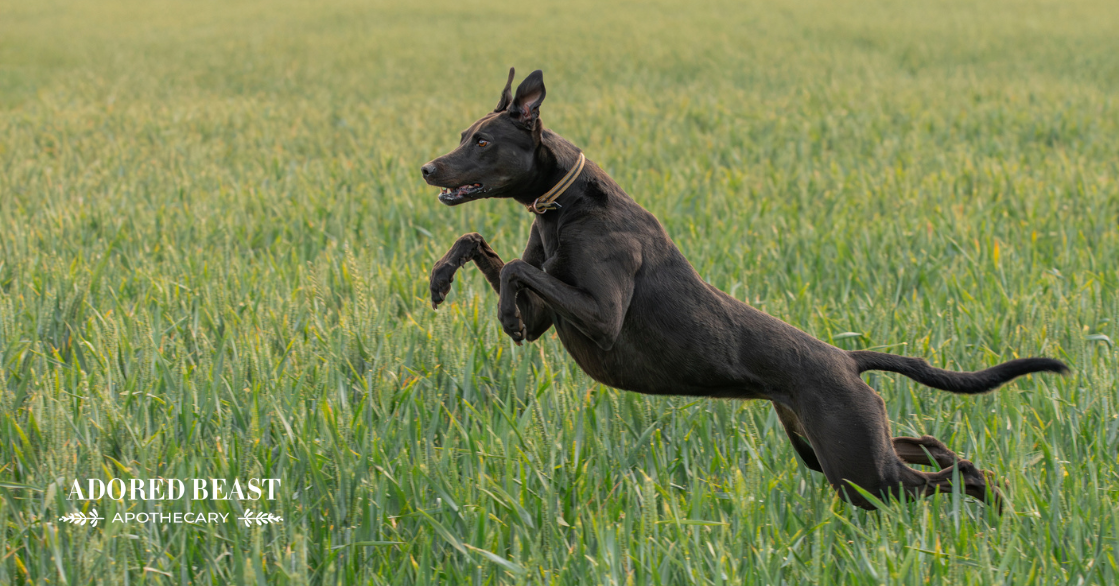If you’ve ever heard your dog make a goose honk-type cough, especially when they’re excited or pulling on a leash, you know how alarming it can be. In some cases, this sound is just the throat reacting to the pulling or activity. However, in other cases, this sound is one of the hallmark signs of collapsing trachea in dogs, a chronic but often manageable condition that affects the tube that carries air from the throat into the lungs.
Understanding what’s happening in your dog’s throat and how to support them naturally can make a world of difference in their comfort and long-term health.
What is Collapsing Trachea in Dogs?
The trachea, or windpipe, is a flexible tube made up of C-shaped cartilage rings that give it structure, with a soft membrane that stretches across the open part of the “C” to complete the tube. As mentioned, this tube brings air from the throat down into the lungs.
In dogs with collapsing trachea, these cartilage rings weaken and begin to lose their rigidity. As a result, when a dog breathes in – or more commonly, breathes out – the trachea partially collapses and narrows, causing that characteristic honking cough and difficulty moving air.
Depending on where the collapse occurs, symptoms may appear:
- In the neck (cervical trachea): the cough worsens when the dog is excited or pulling on a collar.
- In the chest (intrathoracic trachea): symptoms worsen with exercise or panting.
It’s a progressive condition, but the good news is that many dogs live full, happy lives with proper management and supportive care.
What’s Behind the Honk?
There’s no single cause, but several factors can contribute to the weakening of the tracheal cartilage:
- Genetics: Many small breeds are predisposed.
- Age-related degeneration: Cartilage weakens over time, making symptoms more common in middle-aged to senior dogs.
- Chronic airway inflammation: From environmental irritants such as dust, smoke, perfumes, or household cleaners.
- Obesity: Extra weight puts added stress on the respiratory system.
- Poor harness/collar use: Pulling on the neck can worsen symptoms.
It can occur in any dog, but it’s far more common in small and toy breeds, including:
- Yorkshire Terriers
- Pomeranians
- Chihuahuas
- Toy Poodles
- Shih Tzus
- Maltese
- Pugs
- Miniature Poodles
Symptoms of a Collapsing Trachea
Dogs may show symptoms occasionally or daily, depending on severity. Common signs include:
- “Goose honk” coughing (the most recognizable)
- Coughing during excitement, exercise, or when pressure is placed on the throat
- Difficulty breathing or wheezing
- Gagging or retching
- Exercise intolerance
- Bluish gums (in severe cases – this requires immediate vet care)
If you’re unsure whether your dog’s cough fits the collapsing trachea sound, a visit to your trusted veterinarian might be a good idea. They can better analyze the symptoms and diagnose the issue.
Natural Ways to Protect & Prevent
While genetics play a major role, you can support your dog’s airway health and potentially reduce the risk or severity of symptoms.
1. Maintain a Healthy Weight: Excess weight makes breathing harder. A lean dog breathes easier, moves easier, and coughs less.
2. Use a Harness – Never a Collar: Switching to a well-fitted, chest-based harness takes pressure off the throat entirely.
3. Reduce Environmental Irritants: Protect the air your dog breathes by avoiding:
- Cigarette or vape smoke
- Harsh cleaning product fumes
- Dusty areas
- Heavy fragrances, candles, sprays, incense
A home air purifier can help, too. There are even more tips at this post!
4. Support Joint, Cartilage & Tissue Health: Since the issue involves weakening cartilage, nutrients that support joint and connective tissue may help maintain the health of the tracheal rings.
Beneficial supplements include:
- Glucosamine and chondroitin
- Hyaluronic acid
- Collagen supplements
- Omega-3 fatty acids (to help reduce inflammation)
5. Keep Your Dog Calm: Excitement or anxiety often triggers coughing fits. Supporting emotional balance helps:
- Slow, calm introductions to stimulating situations
- Consistent routines
- Anxiety-reducing supplements (e.g., chamomile, L-theanine, or CBD oil)
Natural Ways to Support a Dog Who Already Has a Collapsing Trachea
Once a dog has been diagnosed, natural support can greatly improve comfort, reduce flare-ups, and slow progression. Always work alongside your vet, especially if medication is needed.
1. Harness + Lifestyle Adjustments: Avoid neck collars entirely, and keep exercise gentle and predictable.
2. Anti-Inflammatory Herbs: These may help soothe the airways and reduce irritation (like those found in our Gut Soothe):
- Marshmallow root (coats and soothes mucous membranes)
- Slippery elm (similar soothing effect)
- Licorice root (natural anti-inflammatory)
- Turmeric (mild anti-inflammatory support)
3. Honey for Occasional Coughing: A small amount of raw or Manuka honey can calm minor coughing spells. **Do not give honey to diabetic dogs.
4. Omega-3 Fatty Acids: Omega-3s help reduce inflammation in the airway tissues and support overall respiratory health. Our Potent-Sea is a sustainable option!
5. Improve Air Quality: Clear out any irritants. A humidifier can make breathing easier, especially in dry climates or winter. Specific houseplants also help clear the air (find the best ones in this post.)
6. Support Emotional Well-Being: Because excitement worsens symptoms, calming tools can help:
- Dog-safe herbal calming blends
- Pheromone diffusers
- Gentle massage
- Routine, slow-paced walks
7. Strengthen Immune Health: A healthy airway is more resilient. Consider:
- Medicinal mushrooms (immune & respiratory support)
- Probiotics (the gut is integral in supporting the immune system)
- Phytoplankton (antioxidant support for the whole body)
Collapsing trachea in dogs may sound scary, but with awareness, natural supports, and a few lifestyle adjustments, many dogs live long, comfortable lives. Whether your dog is predisposed or already diagnosed, focusing on anti-inflammatory nutrition, calm routines, proper equipment, and a healthy environment can make an enormous difference.












